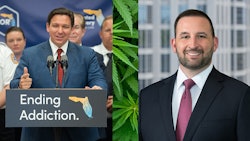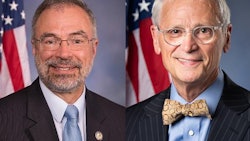
Updated 9:36 a.m., March 15, 2024
Vice President Kamala Harris is slated March 15 to discuss criminal justice reform in a White House meeting with rapper and criminal justice reform proponent Fat Joe and several of those pardoned by the Biden administration for federal offenses of simple possession of cannabis, according to Reuters.
Regional NORML Coordinator Chris Goldstein, along with two other presidential marijuana pardon recipients and Kentucky Gov. Andrew Beshear, will be attending the meeting, according to nonprofit public advocacy group NORML, which also stated that “portions of the meeting are scheduled to be live-streamed in real time by the White House.”
“The meeting comes as Harris, a Democrat, is tasked with convincing people of color and young voters to give President Joe Biden and her a second, four-year term amid fears that voters dissatisfied with sluggish policy reforms may sit out November's election,” Reuters reported.
The meeting also follows President Biden’s mention of federal cannabis policy in his State of the Union address March 7. “Keep building public trust, as I’ve been doing by taking executive action on police reform, and calling for it to be the law of the land, directing my Cabinet to review the federal classification of marijuana, and expunging thousands of convictions for mere possession, because no one should be jailed for using or possessing marijuana!” Biden said during the address, referring to the three-step plan for cannabis policy reform he announced Oct. 6, 2022.
Some cannabis industry constituents praised Biden’s comments as encouraging for cannabis drug policy and ending the stigma around cannabis propagated by reefer madness, as Cannabis Business Times reported—especially as the industry holds its breath awaiting the results of Biden’s request for the review of cannabis’s schedule under the Controlled Substances Act (CSA). (HHS recommended Aug. 29, 2023, to the U.S. Drug Enforcement Administration that cannabis be reclassified to a Schedule III drug, and the ball is now in the DEA’s court).
Others felt the president’s remarks were factually incorrect.
“President Biden was right last night to say that no one should be jailed for marijuana possession or use. But let’s be honest, Biden made two promises on marijuana reform on the 2020 campaign trail – to decriminalize marijuana use and expunge records – and he has failed to deliver either," said Cat Packer, Director of Drug Markets and Legal Regulation at the Drug Policy Alliance, in a statement included in CBT’s report. “Biden’s pardons haven’t released anyone from prison or expunged anyone’s records. And until marijuana is descheduled or removed from the Controlled Substances Act entirely, federal criminalization will continue to ruin countless lives, create barriers to jobs, housing, food, and education and disproportionately harm Black and Brown communities."
Harris and the Biden administration also were criticized by many commenting on social media after Harris released a campaign video Feb. 9 that touted, in part, the White House’s position on cannabis policy.
“In 2020, young voters turned out in record numbers,” Harris said in the video. “And, as a result, President Biden and I … we changed federal marijuana policy, because nobody should have to go to jail just for smoking weed. Elections matter and we have more work to do.”
“This video caused a stir among those connected to the cannabis industry for myriad reasons,” Cannabis Business Times reported. First, because, to date, federal cannabis policy has not changed following Biden’s request for an administrative review of cannabis’s schedule under the CSA. And second, “while Biden issued a proclamation on granting pardons to individuals who ‘may continue to experience the unnecessary collateral consequences of a conviction for simple possession of marijuana, attempted simple possession of marijuana, or use of marijuana,’ zero prisoners have actually been released from federal incarceration as a result of these pardons, according to reform advocate and founder of Mission [Green] Weldon Angelos,” according to CBT.
At least one cannabis industry constituent voiced similar concerns and suggested that the March 15 meeting could be a ploy to energize voters.
“Clearly, the administration understands that taking action to repair the harms of cannabis criminalization will help energize voters who overwhelmingly believe marijuana should be legal,” said Sarah Gersten, executive director and general counsel at cannabis reform nonprofit Last Prisoner Project, in a statement. “But the general public also believes no one should be incarcerated for cannabis, and Biden has failed to keep that campaign promise. Biden could free the over 3,000 federal cannabis prisoners with the stroke of a pen. If he truly wants to tout his actions on cannabis reform, bolder action needs to be taken.”
Others agreed that the time is now for action.
“From this meeting, I hope to see a shift toward comprehensive drug law reform that acknowledges the disproportionate impact of current policies on communities of color,” said Jeffrey M. Zucker, co-founder and president at Green Lion Partners, in a statement. “Reforms prioritizing social justice, harm reduction, and economic empowerment would reflect genuine progress. It's time for action that aligns with my and many others deep-held values of social and environmental justice to create a more equitable space for everyone incarcerated for cannabis and the country at large.”
“While this administration has made positive strides forward on criminal justice reform, the progress is still far too slow,” said David Craig, chief marketing officer of Illicit Gardens, in a statement. “Rescheduling cannabis and pardoning offenders of these punitive laws from a long past era is an easy decision, and is one the DEA has already clearly indicated its support for. Let’s get this done now. There’s no reason for further delay while some American citizens languish behind bars.”



























